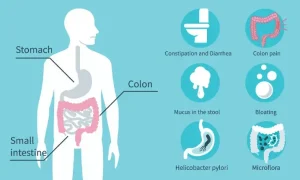Passing gas is typical. It’s the only way for our bodies to get rid of surplus air and the stuff that comes from digestion. But what if the gas gets too bad, especially at night?
For older people, farting can be more than just an inconvenient nuisance; it can make them feel bloated, hinder them from sleeping, and sometimes be a sign of more significant digestive health problems.
If you’ve ever asked yourself, “Why do I fart so much when I sleep?” you’re not the only one. You have a lot of options. Let’s talk about some reasons why this might be happening and what you can do to feel better.

1. The food you eat could be making the flames worse.
Dinner is one of the most prevalent reasons why people get too much gas at night.
As we age, our digestive systems tend to slow down and become more sensitive. Some foods that used to be fine may suddenly make you feel awful, bloated, and gassy, especially at night when digestion slows down naturally.
Some foods that cause older persons gassy are:
Even when cooked the right way, beans and lentils can still make you gassy.
Cruciferous vegetables include broccoli, cabbage, and Brussels sprouts.
Onions and garlic
Bran and whole grains
Dairy products are especially good for people who can’t digest lactose.
Sugar-free candy and gum usually have fake sweeteners like sorbitol, xylitol, and mannitol in them.
If you’ve noticed that some nights are worse than others, try maintaining a basic meal journal. Before bed and the next morning, write down what you ate for dinner and how you felt. You might see a pattern over time that lets you make changes.
2. Having improper eating habits and eating late at night can make gas worse.

It’s not just what you eat; it’s also when and how you eat it.
If you eat too quickly, chew gum, chat while chewing, or drink via a straw, you can swallow air. The air often comes out as gas even hours after the meal is over.
Also, if you eat a lot of food right before bed, your body won’t have enough time to digest it before you go to sleep. Food that hasn’t been digested can ferment in the gut, which can cause gas to build up while you sleep.
Here are some simple things you can do to help:
Eat slowly and pay attention.
While you eat, don’t chat or drink soda.
At least two or three hours before you go to bed, eat your last meal.
Try eating smaller, lighter dinners.
Changing the time by even a little bit can make a major impact in how much gas and bloating you get at night.
3. Lying down slows down digestion.
When you lie down after eating, gravity doesn’t help your body digest food as much as it does when you stand up. This can make food and gas stay in the intestines for longer.
Some people also naturally sleep in positions that let gas out more easily. Have you ever thought about why it seems like you fart more or louder in bed? You aren’t lying.
Studies have shown that sleeping on your left side can help with digestion and slow down the flow of gas through your intestines. Raising your upper body a little bit using a wedge pillow may also help food pass through your body the right way and keep you from getting bloated at night.
4. You may not know that you can’t eat certain foods.
As we age, our bodies and our sensitivities change.
A lot of older people become lactose intolerant later in life, even if they drank milk and ate cheese for years without any difficulties. People who don’t have celiac disease may also develop sensitive to gluten over time.
If you commonly get gas, bloating, or pain after meals, especially if they have dairy or wheat in them, you should see your doctor. If you think you might be allergic to a food, an elimination diet under the care of a doctor could help you find out.
5. The microorganisms in your gut could not be in the appropriate balance.
Your gut system is home to trillions of microorganisms. This is what people often call your gut microbiome. These bacteria help maintain your stomach healthy and digest food. But things like a lousy diet, getting older, stress, being sick, or even taking antibiotics can throw this delicate balance off.
If the wrong kinds of bacteria take over, they could generate too much gas, which is especially bad when you sleep.
Small Intestinal Bacterial Overgrowth (SIBO) is a disorder that can happen when bacteria that should live in the colon start to grow in the small intestine instead. This can make you feel tired, gassy, and bloated, and sometimes you might even lose weight without trying.
What works:
If your symptoms don’t go away, see your doctor.
You might want to think about eating more natural probiotics. Some great examples include yogurt, kefir, and sauerkraut.
Bananas, asparagus, and oats are examples of foods that are high in prebiotics. These foods can assist the “good” bacteria flourish.
One of the finest things you can do to feel better and get less gas at night after 60 is to take care of your gut health.
6. It can be because of problems with digestion.

A lot of the time, farting a lot at night isn’t solely because of what you ate.
It could mean that your digestion isn’t working right, like:
Irritable Bowel Syndrome, or IBS
Gastroesophageal Reflux Disease (GERD)
Constipation that lasts a long time
IBD, which stands for inflammatory bowel disease,
You should see a doctor if you experience gas and also have stomach pain, diarrhea, constipation, heartburn, or changes in your weight. Getting help early can make a big difference.
Don’t keep your suffering to yourself.
Let’s be honest: talking about gas at the dinner table isn’t typical. But if your nocturnal gas keeps coming back, aches, or gets in the way, you need to stop ignoring it.
As we become older, our digestive systems change, and things that used to seem “normal” may not anymore. You shouldn’t be embarrassed of that; instead, you should handle it with care and interest.
Making a few tiny changes to your diet, how you eat, how you sleep, or how you take care of your stomach can make a big difference. If you ever have doubts or anything doesn’t feel right, don’t be hesitant to see your doctor.
In the end, it’s worth it to get a decent night’s sleep and eat well.
